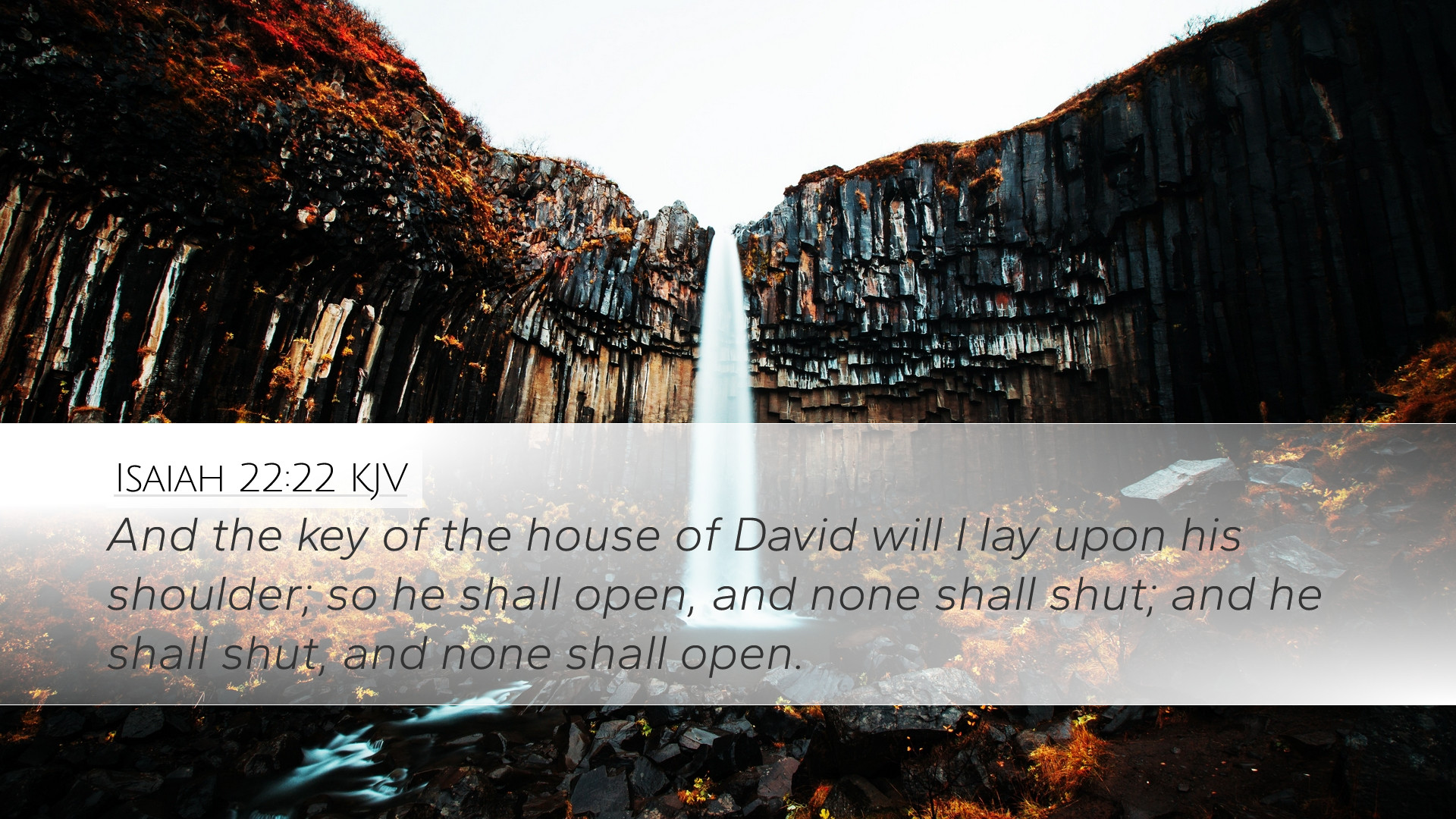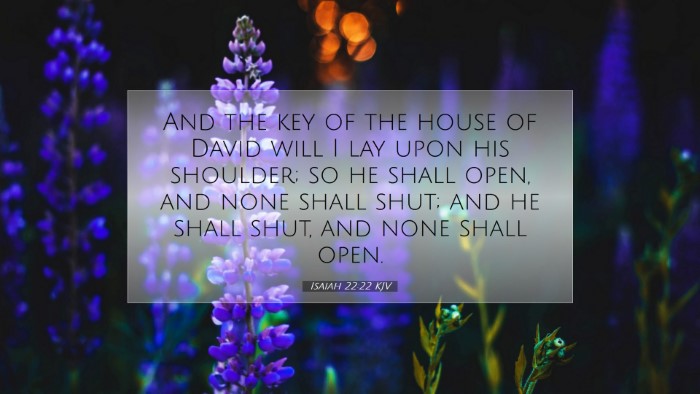Commentary on Isaiah 22:22
Isaiah 22:22 states, "And the key of the house of David will I lay upon his shoulder; so he shall open, and none shall shut; and he shall shut, and none shall open."
Contextual Overview
This verse is set within a prophetic oracle that speaks of judgment and restoration. The context reveals the chaos and corruption in Jerusalem at the time, with Shebna, the royal steward, being the primary figure whose failings are highlighted. God’s judgment upon Shebna emphasizes the need for a faithful leader, which ultimately points to the Messianic role of Jesus Christ.
Commentary Insights
Matthew Henry's Commentary
Matthew Henry notes that the key represents authority and dominion. The imagery of the key of the house of David signifies a transfer of governance and stewardship to Eliakim, who will be faithful where Shebna failed. Henry emphasizes two critical aspects:
- Authority to Govern: The phrase “upon his shoulder” indicates the weight of responsibility placed upon Eliakim, symbolizing not just the authority to manage the household but the moral responsibility that comes with leadership.
- The Sovereignty of God's Will: The assurance that what Eliakim opens or shuts is ordained by God, showing that true power in governance lies in obedience to divine decree.
Henry further associates this passage with the ultimate reign of Christ, who holds the keys of death and Hades (Revelation 1:18), indicating a deeper fulfillment of this promise in the New Testament.
Albert Barnes' Notes
Albert Barnes emphasizes the metaphorical implications of the key, interpreting it as a symbol of power and the authority to allow access or deny it. Barnes asserts:
- Messianic Significance: The key of David is interpreted through the lens of the Messiah, underscoring that all authority in heaven and on earth is ultimately found in Christ, as noted in Matthew 28:18.
- Confidence in Leadership: Eliakim is presented as a guide for the people, one who will lead them back to righteousness and restore what has been lost due to Shebna's unfaithfulness. This aspect reinforces the idea that God provides true leaders to fulfill His purposes.
Barnes also mentions the broader implications for ecclesiastical authority and how it should be exercised, following the example of Christ's servanthood.
Adam Clarke's Commentary
Adam Clarke delves into the implications of the verse concerning the kingdom of David. He states that the ‘key of the house of David’ implies the right to manage the house of David. Clarke highlights:
- Role of Eliakim: Clarke interprets Eliakim’s appointment as a prophetic sign of the ideal leader, contrasting him with Shebna, whose actions brought disgrace. Eliakim's faithfulness renders him the legitimate steward of God’s kingdom.
- Divine Assurance: The promise that Eliakim will open and shut is rooted in God's will; it signifies that Eliakim’s actions will reflect divine authenticity, a commitment to God's covenant.
Clarke also notes the broader eschatological themes related to this passage, including the ultimate authority of Christ to provide access to salvation and the assurance of God's sovereignty over His kingdom.
Theological Implications
This verse has profound theological implications that resonate throughout Scripture. It teaches about:
- God's Sovereignty: At the heart of the passage is God's absolute sovereignty. He decides who will lead His people and ensures that leadership aligns with His divine purpose.
- Christology: The key of David points to Christ, the ultimate King and Priest, whose authority is unchallengeable. He opens the way to salvation and shuts it to those who reject Him.
- Faithful Leadership: The call for faithfulness in leadership echoes throughout the church today. Pastors and spiritual leaders are urged to mirror Christ’s qualities of integrity, sacrifice, and humility.
Conclusion
Isaiah 22:22 encapsulates a promise of restoration and the quality of leadership that God desires for His people. Through the lens of public domain commentaries, we see the depth of meaning in this verse, which not only addresses the historical context of Judah but also foreshadows the coming of Christ. For pastors, students, and theologians, it serves as a reminder of the significance of rightful authority, faithful stewardship, and the overarching sovereignty of God over His kingdom.


